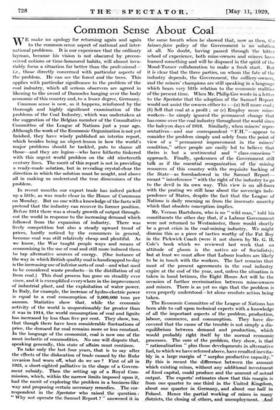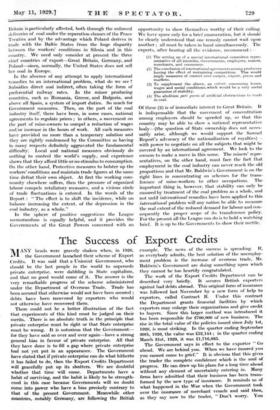Common Sense About Coal
UTE make no apology for returning again and again to the common sense aspect of national and inter- national problems. It is our experience that the ordinary layman, because his vision is not obscured by precon- ceived notions or time-honoured habits, will almost inva- riably focus a situation far better than the professional- i.e., those directly concerned with particular aspects of the problem. He can see the forest and the trees. This applies with particular significance to the problem of the coal industry, which all serious observers are agreed in likening to the sword of Damocles hanging over• the body economic of this country and, to a lesser degree, Germany.
Common sense is now, as it happens, reinforced by the thorough and highly significant examination of the problems of the Coal Industry, which was undertaken at the suggestion of the Belgian member of the Consultative Committee of the League of Nations just a year ago. Although the work of the Economic Organization is not yet finished, they have wisely published an interim report, which besides being an object-lesson in how the world's major problems should be tackled, puts to shame all those—and they are legion—who have hitherto tinkered with this urgent world problem on the old nineteenth century lines. The merit of this report is not in providing a ready-made solution, but in revealing crystal-elear the direction in which the solution must be sought, and above all in making us understand the true dimensions of the problem.
In recent months our export trade has indeed picked up a little, as was made clear in the House of Commons on Monday. But no one with a knowledge of the facts will pretend that the industry can recover its former position. Before 1914 there was a steady growth of output through- out the world in response to the increasing demand which followed from the expansion of industry. There was lively competition but also a steady upward trend of prices, hardly noticed by the consumers in general, because coal was still relatively cheap and plentiful. As we know, the War taught people ways and means of economizing in the use of coal and still more induced them to tap alternative sources of energy. (One instance of the way in which British quality coal is handicapped to-day is the increasing use of inferior sorts of coal—and what used to be considered waste products—in the distillation of oil from coal.) This dual process has gone on steadily ever since, and it is exemplified everywhere in the improvement of industrial plant, and the exploitation of water power. In Italy, for example, the increase of hydro-electric power is equal to a coal consumption of 9,000,000 tons per annum. Statistics show that, while the economic activity of the world is unquestionably far greater than it was in 1914, the world consumption of coal and lignite has increased by less than five per cent. They show, too, that though there have been considerable fluctuations of price, the demand for coal remains more or less constant. In the language of the economist, coal is now one of the most inelastic of commodities. No one will dispute that, speaking generally, this state of affairs must continue.
To take only the last four years, that is to say after the effects of the dislocation of trade caused by the Ruhr invasion had worn off, what do we see ? First of all in 1925, a short-sighted palliative in the shape of a Govern- ment subsidy. Then the setting • up of a Royal Com- mission, which, within the narrow limits imposed upon it, had the merit of exploring the problem in a business-like way and proposing certain necessary remedies. The cor- respondent in the Spectator who raised the question : " Why not operate the Samuel Report ? " answered it in the same breath when he showed that, now as then, the laissez-faire policy of the Government is no solution at all. No doubt, having passed through the bitter 'school of experience, both mine-owners and miners have learned something and will be disposed in the spirit of the Mond-Turner collaboration to make a fresh start. But it is clear that the three parties, on whom the fate of the industry depends, the Government, the colliery-owners, and the miners' champions are still speaking in a language which bears very little relation to the economic realities ofthe present time. When Mr. Philip Gee wrote in a letter to the Spectator that the adoption of the Samuel Report would not assist the owners either to :—(a) Sell more coal ; (b) Sell that coal at a profit ; or (c) Employ more mine- workers—he simply ignored the permanent change that has come over the coal industry throughout the world since the halcyon days of 1913. Similarly, when miners' repre- sentatives—and our correspondent " F.H. "—appear to consider the problem simply and solely from the point of view of a " permanent improvement in the miners' condition," other people are easily led to believe that theirs is but a sentimental and " class-conscious " approach. Finally, spokesmen of the Government still talk as if the essential reorganization of the mining resources of this country with the requisite backing of the State—as foreshadowed in the Samuel Report— meant " interference " with the right of the industry to go to the devil in its own way. This view is on all-fours with the prating we still hear about the sovereign inde- pendence of States, despite the fact that the League of Nations is daily rescuing us from the insensate anarchy which that obsolete conception implies.
Mr. Vernon Hartshorn, who is no " wild man," told his constituents the other day that, if a Labour Government were not returned to Westminster, there would shortly be a great crisis in the coal-mining industry. We might dismiss this as a piece of tactics worthy of the Fat Boy in the Pickwick Coach (were it not shown by Mr. G. H. Cole's book which we reviewed last week that an attitude of gloom is the native- air of Socialists) ; but at least we must allow that "Labour leaders are likely to be in touch with the workers. The fact remains that most of the present agreements in the coal industry expire at the end of the, year, and, unless the situation is taken in hand betimes, the Eight Hours Act will be the occasion of further recrimination between mine-owners and miners. There is as yet no sign that the problem is even properly understood—let alone resolute action being taken.
The Economic Committee of the League of Nations has been able to call upon technical experts with a knowledge of all the important aspects of the problem, production, labour, commerce, and consumption. They have dis- covered that the cause of the trouble is not simply a dis- equilibrium between demand and production, which would probably right itself by the normal economic processes. The core of the problem, they show, is that " rationalization " plus those developments in alternative fuel, to which we have referred above, have resulted inevita- bly in a large margin of " surplus productive capacity." By this is meant the difference between the amount which existing mines, without any additional investment of fixed capital, could produce and the amount of actual output. The experts' estimates show that this margin is from one quarter to one third in the United Kingdom, about one quarter in Germany, and about one half in Poland. Hence the partial working of mines in many districts, the closing of others, and unemployment. And Britain is particularly affected, both through the enforced deliveries of coal under the reparation clauses of the Peace Treaties and by the advantage which Poland derives in trade with the Baltic States from the huge disparity between the workers' conditions in Silesia and in this country. We need only consider at present the three chief countries of export—Great Britain, Germany, and Poland—since, normally, the United States does not sell her coal in Europe.
In the absence of any attempt to apply international remedies to an international problem, what do we see ? Subsidies direct and indirect, often taking the form of preferential railway rates. In the minor producing countries, such as Rumania, Greece, and Bulgaria, and above all Spain, a system of import duties. So much for Government measures. Then, on the part of the coal industry itself, there have been, in some cases, national agreements to regulate prices ; in others, a movement on the part of mine-owners to compel a reduction of wages and/or increase in the hours of work. All such measures have provided no more than a temporary solution and they are rightly condemned by the Committee as having in many respects definitely aggravated the fundamental difficulty. Local and national measures obviously do nothing to control the world's supply, and experience shows that they afford little or no stimulus to consumption. On the other hand, Protective measures to bolster up the workers' conditions and maintain trade figures at the same time defeat their own object. At first the working com- munity elsewhere suffers, then the pressure of organized labour compels retaliatory measures, and a vicious circle of trade fluctuations is entered. In the words of the Report : " The effect is to shift the incidence, while on balance increasing the extent, of the depression in the coal industry, as a whole."
In the sphere of positive suggestions the League memorandum is equally helpful, and it provides the Governments of the Great Powers concerned with an opportunity to show themselves worthy of their calling. We have space only for a brief enumeration, but it should be clearly understood that one remedy cannot wait upon another ; all must be taken in hand simultaneously. The experts, after hearing all the evidence, recommend :- (t) The setting up of a special international committee repre- sentative of all interests, Governments, employers, minors, merchants, and consumers.
(2) The conclusion of international agreements among producers having the effect of restraining competition. This would imply measures of control over output, export, prices and markets.
(3) To supplement the above, an entente concerning hours, wages and social conditions, which would be a very useful guarantee of stability.
(4) The abolition pari passu of artificial obstructions to trade in coal.
Of these (2) is of immediate interest to Great Britain. It is indispensable that the movement of concentration among employers should be speeded up, so that this country may be able to show a national representative body—(the question of State ownership does not neces- sarily arise, although we would support the Samuel Report's advocacy of the nationalization of royalties)— with power to negotiate on all the subjects that might be covered by an international agreement. We look to the owners to make a move in this sense. The miners' repre- sentatives, on the other hand, must face the fact that employment in the coal industry can never reach the old proportions and that Mr. Baldwin's Government is on the right lines in concentrating on schemes for the trans- ference of mine-workers to other occupations. The important thing is, however, that stability can only be ensured by treatment of the coal problem as a whole, and not until international remedies have been applied to this international problem will any nation be able to measure the real extent of the reduced demand for labour and con- sequently the proper scope of its transference policy. For the present all the League can do is to hold a watching brief. It is up to the Governments to show their mettle.











































 Previous page
Previous page